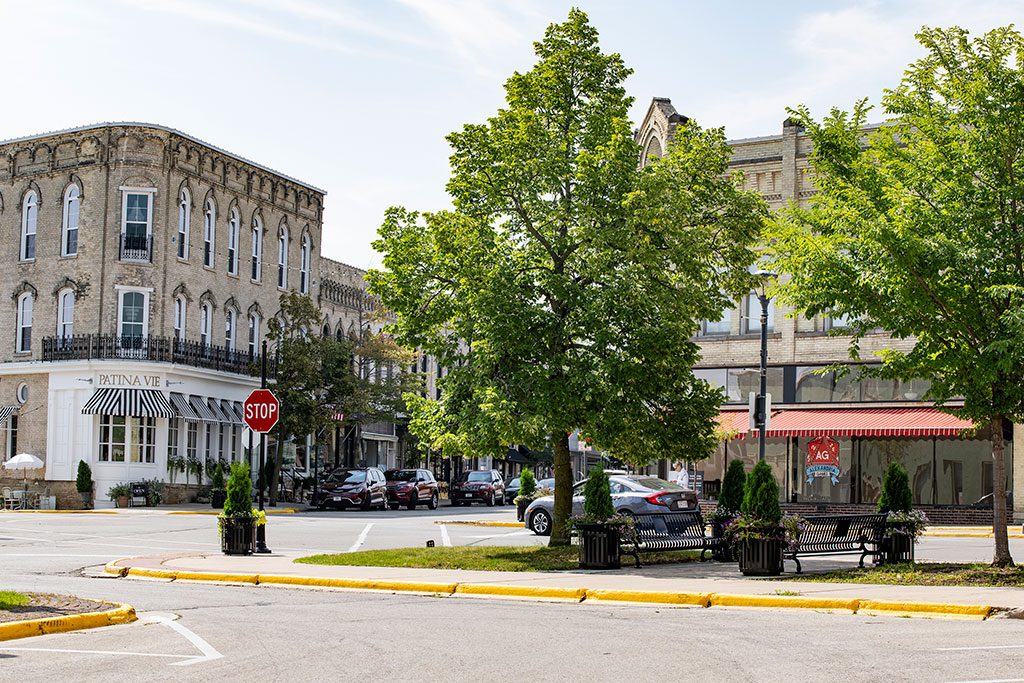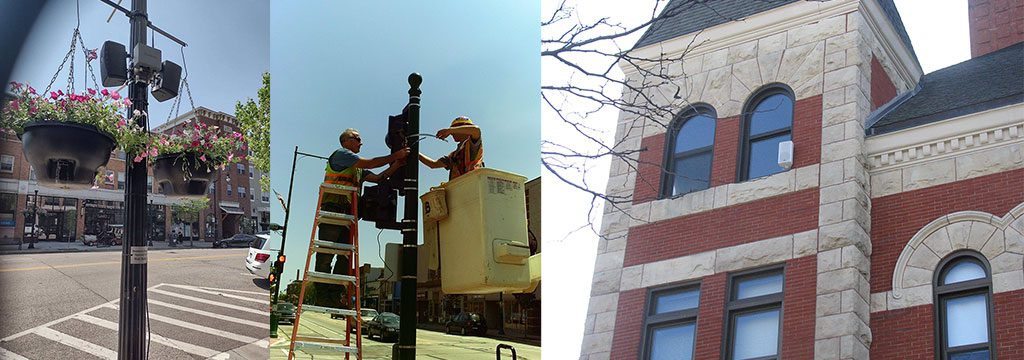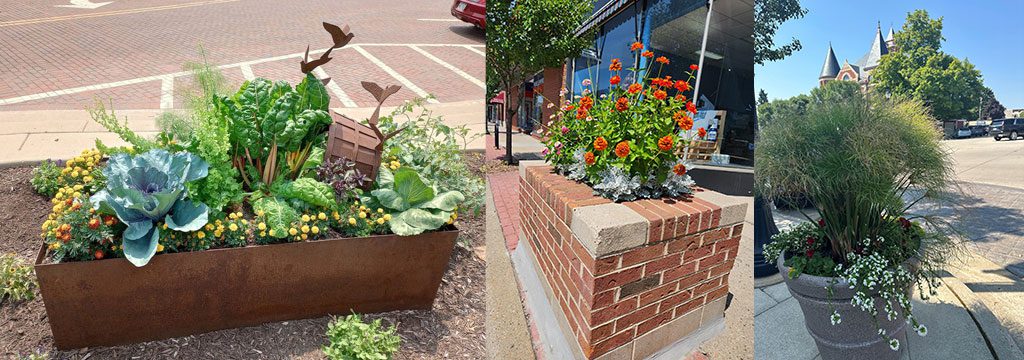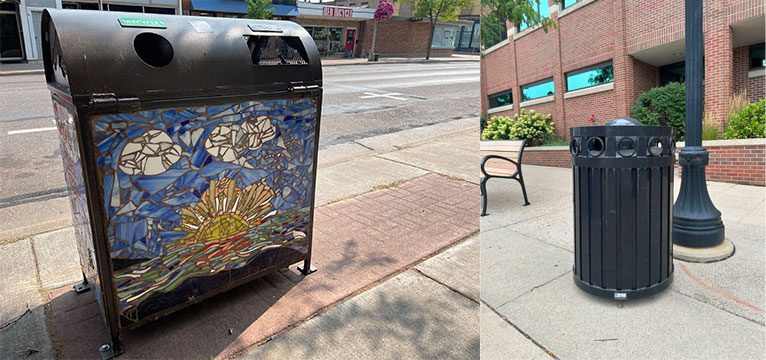
By Adriana Humbert, Wisconsin Main Street
In small downtowns across Wisconsin, the careful selection and arrangement of streetscape elements play a crucial role in creating vibrant and inviting public spaces. From practical amenities to aesthetic enhancements, elements such as audio speakers, benches, flowers, and trash cans contribute to the overall charm and functionality of these urban centers.
This month’s Places Blog explores streetscape best practices and examples from Wisconsin Main Street communities. In the post, you’ll learn how these communities have effectively coordinated, funded, and maintained their streetscape elements and have strategically integrated them to enhance the character and livability of downtown districts.

From left to right:
Speaker on light pole in downtown Beloit, speaker on light pole in downtown West Allis, speaker outside the northeast corner of the Green County Courthouse in Monroe.
Speakers
Strategically placed speaker systems offer more than just functional sound; they provide a means to infuse the environment with carefully selected music, make announcements during events, and contribute to a holiday atmosphere. Whether it’s a classic tune that aligns with the area’s historical significance or contemporary tracks that resonate with the community’s modern energy, music sets a distinct tone. By enveloping visitors in an auditory experience, sound system speakers contribute to a shared sense of place and community, fostering a deeper connection between people and their surroundings.
Beloit: Donations from supporters financed the installation of speakers in downtown Beloit, and each donor is recognized with a plaque on the speaker poles. The primary system infrastructure, including the ongoing expenses of the music program, was funded by the Downtown Beloit Association.
Monroe: In November 2012, MiTek Electronics & Communications contributed four outdoor speakers to the Green County Courthouse. In 2023, courthouse renovations prompted a request to enhance the audio system, so MiTek stepped up again, donating a new set of AtlasIED speakers and an amplifier. MiTek is the parent company of AtlasIED and MTX Audio, both of which have operations in Monroe. This upgrade ensures that the square will continue to enjoy quality music for many years to come.
West Allis: Funding for the speakers in downtown West Allis was provided by the West Allis Downtown’s Main Street program, and the program’s staff maintains the equipment. About 15 years ago, a collaboration between Downtown West Allis and the city’s information technology department resulted in the plan to add speakers, which the city installed. The original speakers on the light poles remain in use, and new antennas and amplifiers have been added. The speakers are used during special events.

From left to right:
Liberace-inspired bench in downtown West Allis, a bench along Monroe’s Main Street, painted benches on Ashland’s Main Street.
Benches
A quintessential feature of a downtown’s streetscape, benches offer more than just places to sit. When positioned thoughtfully along pedestrian pathways, these functional elements provide respite and invite moments of reflection. Visitors can pause, observe the ebb and flow of the downtown, and engage in unhurried conversations. The availability of comfortable seating fosters a sense of inclusivity, making the streetscape accessible to people of all ages and abilities. Benches transform the streets into social spaces, encouraging a slower pace and creating opportunities for connections to flourish.
Ashland: Ashland Main Street received the AARP Community Challenge Grant, which provided the organization with the means to install 20 new benches. The project was executed in two parts: ten benches were painted and set up in 2022, followed by the remaining ten in 2023. The first phase created buzz and recognition, spurring more interest for the second. Ashland Main Street handled bench acquisition, plaques, and the mural project. Each May, the City of Ashland Public Works Department installs the benches, taking them down before winter. During the cold months, the benches are stored at a Public Works facility, returning when the weather warms up and the original artists preserve and maintain the murals, ensuring their long-term care.
Beloit: The benches in downtown Beloit were acquired through the city’s tax incremental financing (TIF) funds, while their ongoing maintenance and replacement costs have come from the maintenance budget of the city’s Main Street organization.
Monroe: There are 25 benches throughout Monroe’s downtown district. These benches, all owned and maintained by Main Street Monroe, can be moved to accommodate events and are stored indoors during the winter months. The eco-friendly benches are crafted from recycled materials, thanks to support from Waunakee-based Graber Manufacturing. Some benches added within the last five years have been sponsored by families in memory of loved ones. Volunteers, including some from local companies, help maintain the structures.
West Allis: The benches in downtown West Allis were installed by the city more than 20 years ago. To keep these benches looking vibrant and inviting, the Main Street program launched a painting initiative, ensuring their ongoing visual appeal. The Main Street program is responsible for the care and maintenance of the benches.

From left to right:
Raised flower beds in downtown Beloit, flowers in downtown West Allis, Planter along Main Street Monroe.
Flowers
Flowers can integrate seamlessly into the downtown streetscape to introduce a touch of nature’s beauty. These living elements—whether in planters, hanging baskets, or landscaped beds—contribute a burst of color and vitality to the environment. Their presence softens concrete and brick surroundings, creating a visual oasis. Beyond aesthetics, flowers provide a serene backdrop for both casual strolls and moments of respite. Their fragrance and vibrant hues invoke a sense of calm, inviting pedestrians to pause and appreciate the small wonders downtown. Flowers infuse the streetscape with a natural elegance that resonates with locals and visitors alike, fostering a stronger connection between the community and its surroundings.
Ashland: The City of Ashland Public Works Department is in charge of hanging the flower baskets every year. They hire a part-time worker during the summer to water the baskets daily, covering the expenses for the water usage and a water truck. The funds for these baskets come from the Beautification Fund, a specific allocation in the City’s budget. This fund supports the volunteer-driven Beautification Committee in the City of Ashland.
Beloit: Flowers in downtown Beloit are funded both by sponsors and by the Main Street budget. In addition to hanging baskets, the Main Street program has installed raised planter beds in several areas and has purchased planter chairs filled with mums that are placed around downtown in the fall. The design committee often collaborates with local artists and vendors to brainstorm ideas and strategize about fundraising.
Monroe: There are 45 flowerpots throughout Main Street Monroe. The summer planting, which kicks off in early May, is a collaborative effort with the GWFC Monroe Woman’s Club, the largest chapter of its kind in the state. For the past three years, volunteers and shop owners have shared the responsibility of watering the flowers. Until then, a local organization that provides jobs for people with mental or physical disabilities handled watering duties. In late October, the vibrant summer blooms are replaced by seasonal evergreens, dogwood branches, and reusable winter berries; many of the evergreens come from a nearby Christmas tree farm. The project involves a well-coordinated team effort, as city employees remove the previous season’s flowers, the Lions Club handles the trimming and transportation of the branches, Main Street Monroe and the Woman’s Club provide volunteers, and an area 4H club handles the planting.
West Allis: West Allis Downtown collaborated with Milwaukee Area Technical College to have the school’s masonry department craft the brick planters for the downtown area. The Main Street program takes charge of purchasing flowers, as well as covering any maintenance costs. Business owners and volunteers tend to the planters and water their flowers.

From left to right:
Mosaic trash cans on Ashland’s Main Street, trash cans in downtown Monroe.
Trash/recycling
Discreetly stationed throughout the downtown streetscape, trash cans play an essential role in maintaining both the visual appeal and the functionality of the urban environment. By providing convenient receptacles for litter, trash cans contribute to a sense of order and hygiene, prevent clutter, and enhance the overall aesthetic. Their strategic placement encourages responsible waste disposal by pedestrians and businesses, fostering a collective commitment to keep the streetscape clean. Whether they are plain or decorative, trash cans help preserve the charm of the downtown.
Ashland: Within Ashland’s Main Street district, you’ll find 12 distinct mosaic trash cans, each one a unique piece of art. In a collaboration between the City of Ashland and Ashland High School, welding students at the school created the trash cans, with mosaic panels designed by the school’s art department and community groups. These designs depict the local environment and highlight the city’s slogan, “Find yourself next to the water.” The decorative trash containers also made recycling options available downtown.
The project received a $1,700 grant from the Ashland Foundation and about $800 in donations from community groups. The City of Ashland covered the remaining costs and handles ongoing maintenance of the trash bins.
Beloit: As it did with the benches, the City of Beloit used TIF funds to obtain trash cans for the downtown area. Responsibility for their maintenance and replacement belongs to the Main Street organization, and the city handles trash and recycling collection.
Monroe: The Main Street Monroe trash containers were installed during a major streetscape project in 2009. Main Street Monroe handles maintenance and has covered the costs of occasional replacements over the last five years.
West Allis: The city manages weekly cleaning of the trash cans in downtown West Allis, and the Main Street program hires a part-time employee to collect trash from the streets, sidewalks, and alleys. The employee tackles weed removal during the summer months and makes sure snow is cleared around fire hydrants, trash cans, and crosswalks during the winter.
